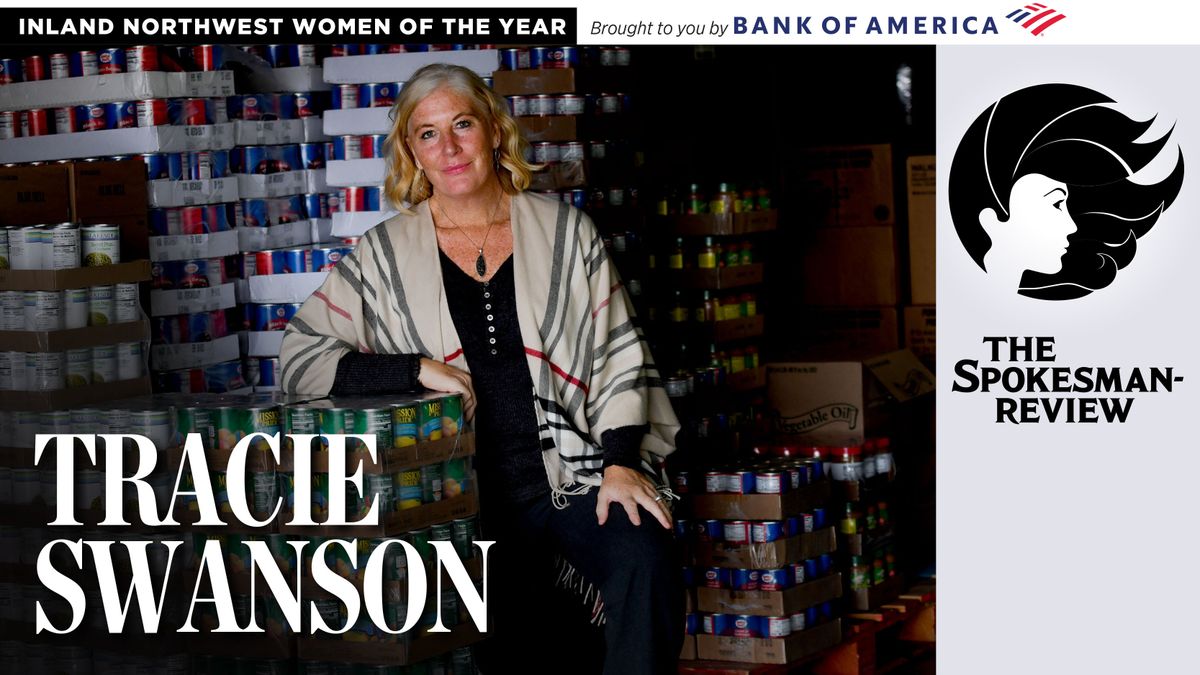Giving people chances: Swanson leads food bank that has seen huge uptick in demand during pandemic

Tracie Swanson doesn’t seem to like talking about herself much. When she’s the topic of discussion she looks nervous and becomes a woman of few words.
But ask her a question about Our Place, the food bank she runs in West Central Spokane, and she lights up while explaining how the nonprofit has adapted to helping tens of thousands more people during the pandemic. And she has plenty to say when praising her volunteers and the services offered.
Not every food bank has a place where clients can do their laundry for free, Swanson said, pointing out new-looking machines that are 13 years old, kept in tip-top shape by Laundry Service Manager Bob Carlson.
Swanson has been at Our Place for 13 years. As executive director, she said the food bank’s impact has increased dramatically during the COVID-19 pandemic.
Pre-pandemic, Our Place might have had 1,000 or so clients a month in need of food, clothes, hygiene products, utility assistance and bus passes. In general, a lot of Our Place’s clients are seniors on fixed incomes, the homeless and people with disabilities.
Due to the pandemic, the number of people needing Our Place’s help has spiked.
“So many people who have never visited a food bank before are now visiting,” Swanson said.
In September of this year, 4,450 came to Our Place. On one Thursday alone in mid-October, the food bank had 750 visitors.
A lot has changed at Our Place during the pandemic in addition to the dramatic increase in people needing food.
In the past, Our Place, like many food banks, required clients to provide identification for all of their family members. Plus, there were limits on how often people could come for food. People who lived in the West Central neighborhood could come twice a month and people outside of the neighborhood could visit once.
Now the ID requirement and the visit limits are things of the past.
“We want to reduce the barriers,” Swanson said. “We want to take away the stigma of visiting a food bank.”
Federal funding through the CARES Act helped make much of that possible. There’s been more food made available to food banks, although Swanson noted it’s been difficult to find volunteers during the pandemic.
Our Place has also made another significant change: People who come for food, clothes and hygiene products can volunteer now.
“Most people don’t want to just receive,” Swanson said. “They want to give as well.”
On top of that, Our Place now gives visitors the opportunity to pick out more of the foods they want to take home, farmers market style.
People who have worked at Our Place said Swanson is a great leader in a handful of different ways.
Swanson said she learned a lot from her predecessor at Our Place, sister Ann Pizelo of Sisters of the Holy Names.
“She taught me a lot about leadership; that leaders can be kind,” Swanson said. “She, like myself, was not a micromanager.”
Ashley Bean, one of Swanson’s nieces who grew up volunteering at Our Place, said her aunt simply treats people right.
“As a member of her family I can say this – she treats them (Our Place clients and volunteers) like her family,” Bean said.
Heidi Lasher, an Our Place volunteer, said she thinks Swanson is a gifted leader. She shared a story about how Swanson helped Tim Dodds.
Dodds came to Our Place hoping to borrow a shovel so he could make money clearing snow. Swanson got him a shovel, and after making $40, Dodds returned to give it back. Swanson told him to keep it.
“She said, ‘Well, keep the shovel and keep working,’ ” Lasher said. “And he did.”
Dodds is now an Our Place volunteer.
Lasher said Swanson gives people chances.
“I think Tracie’s just created a culture where the clients are really trusted and given a lot of leeway to make decisions for themselves,” she said.
Our Place volunteer Michele Bennington agreed.
“She doesn’t place barriers on people,” Bennington said.
Lasher said Swanson’s leadership style stands out.
“I think that she’s one of those people that doesn’t lead in a traditionally masculine, hierarchical way,” Lasher said. “She’s an understated leader, I think, and really makes room for people to shine.”
“I think she trusts people that, in their lives, haven’t been trusted as much. She finds a way to bring out the best in them and finds a way to help them be successful.”